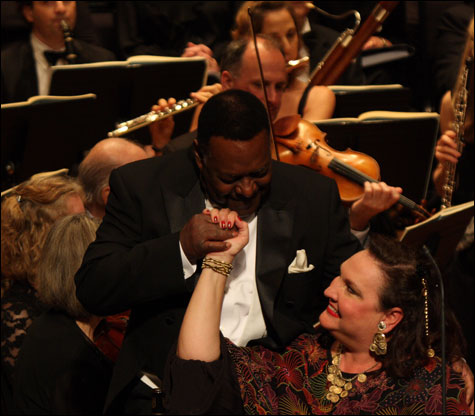
CARMEN Robert Honeysucker, here with Victoria Livengood, made Escamillo’s “Toreador Song”
the song of seduction that Bizet intended. |
Most people probably think of the Cantata Singers as specializing in early choral music, especially Bach, forgetting how much 20th-century and contemporary music director David Hoose has focused on. This season’s “Unveiling Weill” spotlit Kurt Weill, the concerts ranging from Boston premieres of rarely heard works (like the 1929 radio cantata Der Lindberghflug — ”The Lindbergh Flight” — and Die Propheten, an extended section of Weill’s ambitious Biblical epic Der Weg der Verheißung|The Eternal Road) to delicious performances of his most famous songs, some preceding the official program or following intermission. At the final concert last month, soprano Megan Beltran’s poignant rendering of “Fennimore’s Song” — about the humiliation of being a poor relation, from Der Silbersee|The Silver Sea (1932-’33) — made me want to hear the entire opera. The major Weill on that program was the scintillating, characterful Symphony No. 2 (1934). Hoose called it “as close to unfettered joy as Weill can get,” a surprising description of this nervy, restless piece with its echoes of Silbersee, dourly lamenting funeral march, and ominous undercurrent of drumming, though also with a gorgeously overflowing love theme (introduced here by oboist Peggy Pearson). Is the ending festive or desperate?All season, Hoose paired Weill with composers he evolved from, offered alternatives to, or stimulated: Brahms, Schoenberg, Dallapiccola, Busoni, Orff. We got the world premiere of Lior Navok’s Slavery Documents 3: And the Trains Kept Coming . . . (a Cantata Singers commission, dealing with the Holocaust), and, on the final program, the Boston premiere of Charles Fussell’s High Bridge — A Choral Symphony After Poems by Hart Crane — four extended sections of “The Bridge” plus the visionary “Atlantis,” which Fussell added after the first performance in 2003.
Fussell’s score has an old-fashioned romantic fervor and welcoming tonality — a knowing counterpart to Crane’s intensely rhetorical musicality. “The Harbor Dawn” begins with quiet chiming and then a wash of sound; two lovers are in bed (soprano Karyl Ryczek and tenor William Hite, though surely Crane’s bedmate was a sailor he’d picked up). “Cutty Sark” is an edgier, extroverted folk comedy of tall tales (delivered with gusto by baritone David Kravitz) that turns into something more mysterious and ends with the chorus humming and the words disappearing into the horizon. An extended orchestral “portrait” of Crane is the heart of the piece, but my favorite section was probably the haunting “Indiana,” given mezzo-soprano Janna Baty’s amplitude and luscious vocalism and the glistening pointillism of vibraphone, harp, and celesta. High Bridge now has two endings: “Virginia” — chimes, gong, drum rolls — is a big-finish Scherzo but not the full resolution that “Atlantis,” with its ecstatic repetitions and eerie final diminuendo, represents. I can’t imagine a performance more committed or powerful.

“This was Craig’s, now it’s yours.” That’s what was written on the card that came with the present — Craig Smith’s “maestro” towel — that the Emmanuel Music musicians gave their newest conductor, Mark Morris. It wasn’t the only thing that belonged to Morris. The Celebrity Series of Boston ended its season last weekend by bringing Morris back with his Dance Group in Henry Purcell’s opera Dido and Aeneas. At Dido’s Boston premiere, which reopened the Majestic Theatre in 1989, Craig Smith conducted the Emmanuel chorus and orchestra, with heartbreaking, heroic Lorraine Hunt (not yet an alto or a Lieberson) and the magnificent baritone James Maddalena singing the doomed lovers, and tenor Frank Kelley singing (or cackling) the Sorceress, Dido’s nemesis and alter ego. (Morris himself danced both roles — now both parts are danced by either Amber Darragh or Bradon McDonald.) Soprano Jayne West sang Dido’s loving sister, Belinda.
This time, the singers (in the orchestra pit) included, as Dido, soprano Kendra Colton at her most ravishing and full-hearted, and Donald Wilkinson, vigorous and agonized as Purcell’s not very sympathetic hero. West was still a lovely Belinda — she and Colton both have relatively light voices, so they really sounded like sisters. Deborah Rentz-Moore made an impressive, ripe-toned Sorceress, and Kelley was back, and a delight, as the “boozy” sailor. Pamela Dellal (also returning from 1989) and Kristen Watson sang smaller roles beautifully.
Nahum Tate’s libretto has some memorably silly dialogue. When Dido guilt-trips Aeneas into disobeying the gods’ orders, her pride refuses to accept his change of heart: “Away, away!” she commands. “No, no, I’ll stay!” he insists. They keep repeating these rhymes. Colton made a poignant distinction between her angry dismissal (“Away!”) and her sorrowful final realization that Aeneas is really going “away . . . ”
Morris didn’t take an opening bow, perhaps wanting to keep the spotlight focused on the dancers and singers. But he led with Smith’s remarkable combination of gravity and buoyancy. He got the orchestra to embody, even caress, each phrase. He found and maintained the rhythmic life not only in Purcell’s teasing, earthy jollity but also in his profound solemnity, providing sympathetic support for dancers and musicians alike. The final moments, the tragic funereal procession of Dido’s sister and subjects, were exquisite in their slow dissolve. Of course the center of the piece is Morris’s extraordinary choreography, but this was the rare Dido you could love even with your eyes closed.